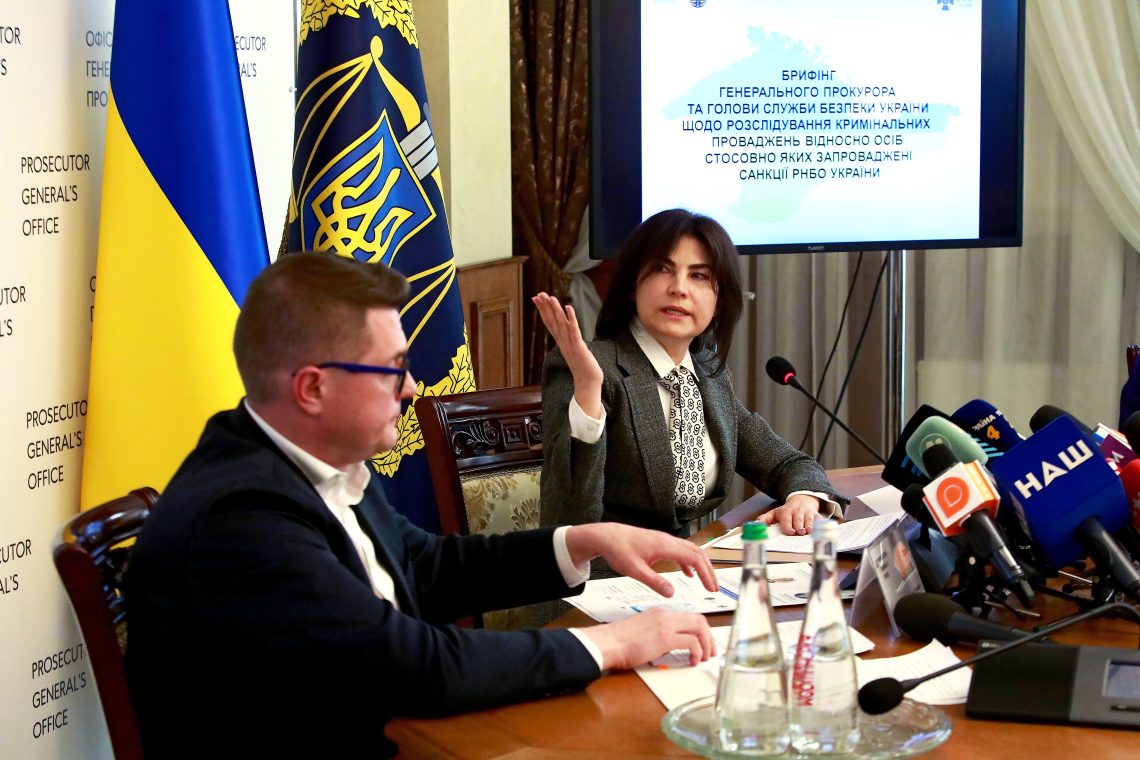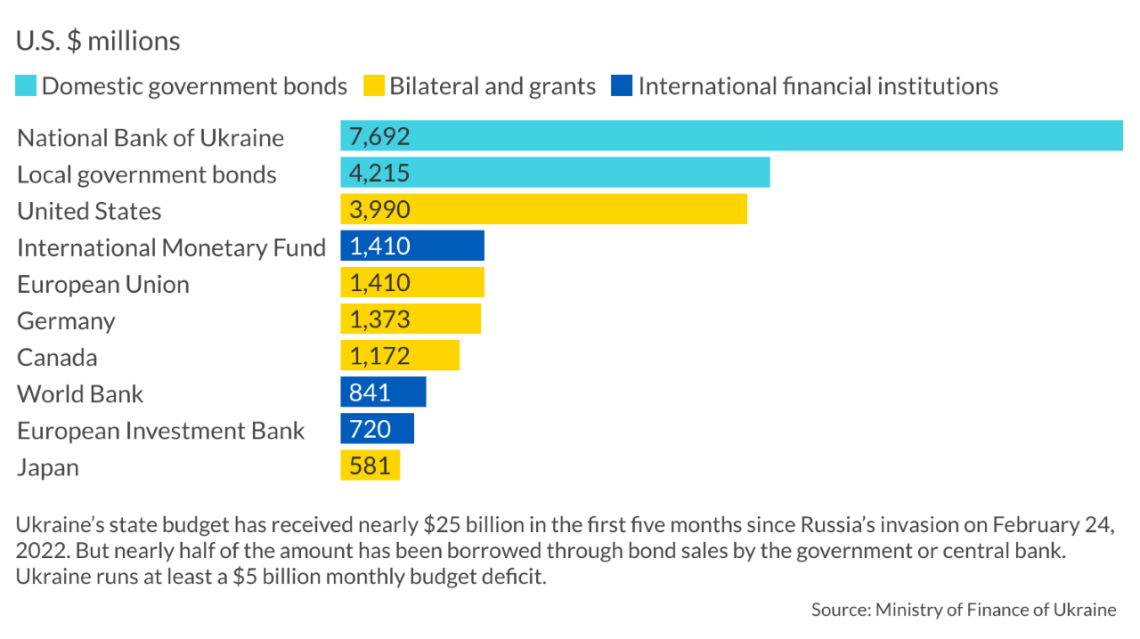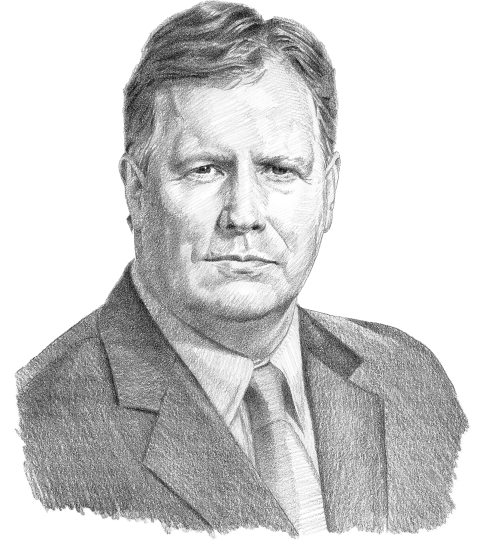Ukraine’s war effort is hobbled by spies, traitors – and corruption
President Volodymyr Zelenskiy fired the nation’s top two law enforcers, triggering the latest scandal over Ukraine’s corruption and weak governance.

In a nutshell
- The firings of Iryna Venediktova and Ivan Bakanov highlight a governance crisis
- Ukraine is investigating hundreds of suspected treason cases among prosecutors and intelligence agents
- Corruption and traitors are damaging Ukraine’s valiant war against Russia’s invasion
Five months into Russia’s war, Ukrainian President Volodymyr Zelenskiy sacked the two most powerful law enforcement officials in the nation, both of them handpicked by him despite criticism that they were chosen more for loyalty than competence. Parliament ratified the dismissals on July 19. The firings of Prosecutor General Iryna Venediktova, a university law professor, and Security Service of Ukraine head Ivan Bakanov, Zelensky’s friend since childhood, exposed more than incompetence.
Mr. Zelenskiy issued an extraordinary statement saying that hundreds of investigations have been opened into suspicions that prosecutors and members of the Security Service of Ukraine, known as the SBU, collaborated with the Russian enemy. These are no ordinary agencies. They remain structured in much the same way as in Soviet times. They are bloated with personnel – at least 27,000 SBU agents and 10,000 prosecutors. Their reputations are for engaging in corruption rather than fighting it.
Dual alliances, turncoats and spies are nothing new in this part of the world, especially in a relationship as historically intertwined as the one between Russia and Ukraine. The optimistic view is that Ukraine’s ability to detect such malfeasance is a healthy sign of self-cleansing. But these explosive allegations, and events that preceded them, also show that Ukraine’s governance problems remain acute – and threaten the nation’s survival at this perilous juncture.
Helping the enemy
Officials in powerful positions may have betrayed the public trust in ways that gave Russia its biggest victories in the first days after its February 24 invasion. While Kyiv’s forces were blocking Moscow’s advances around the capital, as well as in the north and much of the east, Russia in the south was able to quickly march up from the Crimean Peninsula, illegally annexed by the Kremlin in 2014, and capture the southern port city and provincial capital of Kherson. Also, moving north through the Kherson Oblast village of Chonhar, Russian forces staged devastating advances against Melitopol and Mariupol. The Russians now control these major southeastern cities, or what is left of them, as well as 20 percent of Ukrainian territory.
In March, President Zelenskiy accused Andriy Naumov, who headed the department of internal security at the SBU, and Serhiy Kryvoruchko, head of the SBU in Kherson, of treason. Mr. Naumov fled Ukraine hours before the invasion and was arrested in Serbia with nearly $750,000 in cash. The former head of the agency’s Crimean department, Oleh Kulinich, was also arrested in July after being fired in March and is accused of treason. Many questions remain unanswered, including what Ms. Venediktova and Mr. Bakanov knew and did, why Mr. Zelenskiy did not act earlier, how deep the Russian infiltration runs and what is going on today that the world does not know about yet.
Facts & figures
Russian-fueled corruption
In many ways, this episode is just a continuation of a 31-year pattern in post-Soviet Ukraine: high-level corruption, partly fueled by Russia, and impunity.
All three defense ministers of Ukraine’s Kremlin-backed President Viktor Yanukovych remain wanted for treason, desertion or other crimes and are believed to be living in Russia. By the time Mr. Yanukovych fled to Russia in 2014 at the height of the Euromaidan Revolution (also known as the Revolution of Dignity), he left a hollowed-out military that paved the way for the Kremlin’s quick seizure of Crimea eight years ago. The fugitive ex-president even strengthened Russia by giving it a 25-year extension of its Black Sea Fleet base in Crimea.
Nobody has ever been convicted of high-level corruption in Ukraine, including during the two-year tenure of Prosecutor General Iryna Venediktova.
By official estimates, Mr. Yanukovych and his cronies stole an estimated $40 billion during his four years in office. Most of it has never been recovered.
But even before President Yanukovych, the fortunes of Ukraine’s oligarchs – the industrial barons who snapped up independent Ukraine’s most valuable steel mills, chemical plants and other enterprises in sham privatizations – depended heavily on cheap gas from Russia. This subsidy came with a high political price tag as Russia interfered relentlessly and sometimes successfully in Ukrainian politics.
Nobody has ever been convicted of high-level corruption in Ukraine, including during the two-year tenure of Ms. Venediktova.
But the ultimate responsibility belongs to the president. Mr. Zelenskiy is already drawing fire for appointing the deputies of Ms. Venediktova and Mr. Bakanov as acting heads of the agencies. On July 27, he announced that Andriy Kostin, a member of parliament from the president’s party, is his choice for prosecutor general. The move drew immediate criticism from judicial watchdogs.
Moreover, President Zelenskiy recently is reported to have revoked the Ukrainian citizenship of billionaire Ihor Kolomoisky, with whom Mr. Zelenskiy did business as an entertainer and whose popular TV channel helped propel the president to office in 2019. While such a step may look like a crackdown, the move helps Mr. Kolomoisky avoid the sanctions that an oligarch designation would require under a new Ukrainian law. And it could allow the businessman to escape any criminal charges in Ukraine for an alleged $6 billion bank fraud during his ownership of the now state-owned PrivatBank, the nation’s largest financial institution.
The world today knows President Volodymyr Zelenskiy as a heroic war president. Before the war, however, his popularity was declining because he was not making headway against corruption.
The world today knows Mr. Zelenskiy as a heroic war president. Before the war, however, Zelenskiy’s popularity was declining because he was not making headway against corruption. He drew criticism for many things, including lashing out against investigative journalists who secretly recorded the brother of his powerful chief of staff, Andriy Yermak, apparently selling high-level state appointments.
Tracking weapons
But corruption and collaboration in war have far more serious consequences.
This month, Ukraine said it would do a better job of tracking the $10 billion in weapons that the West is providing to quell concerns that some of the equipment is being smuggled out and sold on the black market. Military procurement for an increased defense budget in Ukraine remains opaque, and corruption flourishes in secrecy. Amid martial law, President Zelenskiy has monopolized the television news through unified broadcasts of once-competing TV news outlets that are now subject to state censorship during the war, limiting news unfavorable to the regime.
Russia’s military budget of $70 billion is 10 times the size of Ukraine’s. Even though Western aid has narrowed the disparity, Ukraine can ill afford to waste any resources.
The flaws in Ukraine’s fragile democracy pale in comparison to the Kremlin’s hardened autocracy, hobbled by its own corruption during this war. But Russia’s military budget of $70 billion is 10 times the size of Ukraine’s. Even though Western aid has narrowed the disparity, Ukraine can ill afford to waste any resources. It is difficult to see how Ukraine can win the war if corruption flourishes and nobody in authority – as the records of Ms. Venediktova and Mr. Bakanov showed – is doing anything about it.
Scenarios
Corruption flourishes
The most likely yet least desirable scenario is that Ukraine’s corruption will go unabated with deadly wartime consequences. Russian infiltration of Ukraine remains high. The explosive allegations that possibly hundreds of prosecutors or security service agents have been working on behalf of Russia since the start of the war highlight the incompetence or complicity of Ms. Venediktova or Mr. Bakanov.
It is also not clear how the presence of these spies became known. It is conceivable that Western governments, after learning of the Kremlin agents through their intelligence sources, gave Mr. Zelenskiy an ultimatum: Clean up the mess or face loss of support.
A similar message may have been relayed concerning Ukraine’s lackluster corruption fight. The nation simply does not have any institutions that have shown an interest or capability in rooting out graft and prosecuting it. The police, prosecutors and courts remain largely distrusted by society and susceptible to bribery or political pressure. And getting a high position in government has traditionally been a way to exploit the nation’s institutional weaknesses to get rich.
The most immediate danger is that, if Ukraine cannot show Western donors that they are spending the tens of billions of dollars in pledged financial aid and donated weapons wisely, the support will vanish.
Ukraine’s economy and possibly its war effort could collapse without Western support. On the battlefield, Western weaponry has been decisive in helping Ukrainian soldiers repel Russian advances. Financially, Ukraine’s currency has plummeted to nearly 40 hryvnia to the dollar after an official devaluation this month of 25 percent. Gross domestic product is set to contract by a third or more in 2022. The government is running deficits at least $5 billion monthly. Ukraine’s state oil and gas monopoly, Naftogaz, the largest business in Ukraine, recently defaulted on bond payments to investors. Prime Minister Denys Shmyhal asked the United States to supply Ukraine with natural gas to get through the winter.
Corruption fails
The least likely yet most desirable scenario is that Mr. Zelenskiy, supported by the overwhelming majority of Ukrainians who are committed to victory against Russia, will tackle corruption with relentless vigor.
This change will require a higher degree of transparency and a greater sense of public interest than Ukrainian authorities have shown before.
A zero-tolerance approach may require the Ukrainian leader to use his enormous wartime powers to establish an elite unit of police, prosecutors and judges that investigates and adjudicates the most serious cases of corruption. A top priority must be ensuring Western donors that their money is well-spent and not pocketed by insiders. Such an approach will also require a greater tolerance of independent and investigative journalism than the Ukrainian leader has shown during his first three years in office.
Since 2014, Ukrainian officials have been fond of saying they are fighting a two-front war: One against a foreign invader, Russia, and another against a domestic enemy, corruption, that has weakened Ukraine’s economic prospects and ability to defend itself. The truth is that successive Ukrainian governments have never gotten around to fighting the war against corruption and Mr. Zelenskiy has been no different. He has protected his friends and has stalled on creating truly independent institutions that the presidential administration cannot control.
Now, with tens of billions of dollars of financial aid and an inflow of weapons posing unprecedented temptations to Ukraine’s corruption-minded elite, survival on the battlefield and against Russian infiltrators may depend on the nation’s ability to create a strong and vibrant democracy while at war.






